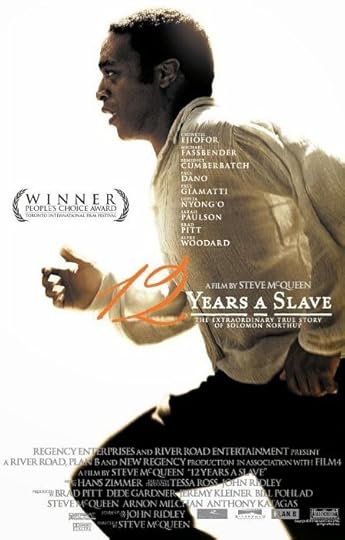12 Years a Slave: Two Different Kinds of Chains

Just in time for Black History Month, I finally saw 12 Years a Slave. Given the film’s strong subject matter and stellar cast, I knew it was worthy of my attention. Still, a harshly realistic story about slavery in the Ante Bellum south didn’t sound like much fun.
Many moviegoers have obviously felt the same way. Though 12 Years a Slave has received strong critical response, not to mention 9 Academy Award nominations, it has racked up nowhere near the box office of its Oscar rivals, Gravity and American Hustle. What’s exciting is that any of these three very different films could win. As a group they remind me of the diverse kinds of movies that have nabbed Best Picture Oscars in the past. 12 Years a Slave is serious, sober, implicitly using the film medium to help right an old wrong. In this it feels something like Schindler’s List: cinema as history lesson. American Hustle, by contrast, is charming in its audacity. It may have vague historical implications, but mostly it’s about the twists and turns of a scam, as practiced by skillful con artists. Doesn’t that sound like 1973’s delightful Oscar winner, The Sting?
Then there’s Gravity, whose ambitions are epic in scope. In its technical mastery of the film medium on a grand scale, it falls into the category of a David Lean film, or perhaps James Cameron’s Titanic. Its underlying metaphysical questioning of man’s (or woman’s) place in the universe is of course more reminiscent of Kubrick’s 2001: A Space Odyssey. That groundbreaking film was not even nominated for Best Picture, though it won an Oscar for its visual effects and Kubrick made the Best Director short list. Alfonso Cuarón has received the Directors Guild award for Gravity, and perhaps he’ll be similarly honored come Oscar night.
In all this I haven’t said much about my personal reaction to 12 Years a Slave. I found the film well-directed, beautiful to look at, and peopled with strong actors. I’ve admired the versatile Chiwetel Ejiofor for years -- check him out as a very different kind of man in Kinky Boots! -- and there’s good work done in large roles and small. Still, 12 Years a Slave struck me as somewhat flat and dutiful. Perhaps this can be blamed on the eighteenth-century source material, but Solomon Northrup’s character seemed short on complexity, and his final release from bondage lacked the dramatic power I would have expected.
But maybe there’s a reason for my rather tepid emotional response. I saw the film during the daytime, in a multiplex much favored by senior citizens. Just before the lights dimmed, an elderly man entered, carefully shepherding a woman of his own age who seemed physically and mentally “off.” They didn’t sit near me, but soon there was no overlooking this woman’s disabilities. She began talking loudly, completely oblivious to the decorum expected of moviegoers. The man tried to shush her, as did the polite young usher who was eventually summoned. It was clear she was wrestling with dementia, and removing her for the sake of the other patrons would have been neither easy nor – come to that – humane. So I, like the others, tried hard to tune out her ranting. Still, I felt profoundly sorry for her, and for the man who was obviously trying hard to cope. The sadness of their story, unfolding a few rows away from me, effectively trumped the tale I was watching on screen.
A good thing this wasn’t Florida, where moviegoers carry loaded weapons to pay back those who disturb their concentration.
Published on February 07, 2014 10:03
No comments have been added yet.
Beverly in Movieland
I write twice weekly, covering topics relating to movies, moviemaking, and growing up Hollywood-adjacent. I believe that movies can change lives, and I'm always happy to hear from readers who'd like t
I write twice weekly, covering topics relating to movies, moviemaking, and growing up Hollywood-adjacent. I believe that movies can change lives, and I'm always happy to hear from readers who'd like to discuss that point.
...more
- Beverly Gray's profile
- 10 followers



